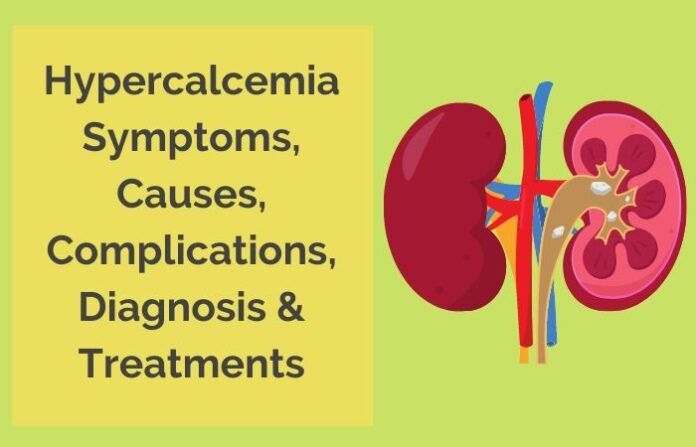Excess of everything is bad, and this goes true even when it comes to essential nutrients in the body like calcium. Since childhood, we are told that calcium is important for bones, teeth, and proper growth of the body. So, one can simply not imagine that the excess of this nutrient can be harmful too. Excessive calcium levels in the blood may give rise to hypercalcemia symptoms in the body.
So, what is hypercalcemia? What are the common signs of hypercalcemia and how is it diagnosed? Is there any effective treatment for this health condition and when to see the doctor? Read on to get answers to all these queries about Hypercalcemia in this article.
What is Hypercalcemia?
Hypercalcemia is a common health condition when there is an excessive level of calcium found in the blood. These higher calcium levels in the blood are detected through a blood test. It is difficult to detect the signs of hypercalcemia unless detected through some blood tests recommended by a physician. Due to hypercalcemia, a person’s body finds it hard to carry out the day-to-day functions normally. Moreover, if the calcium levels are extremely high, hypercalcemia can turn out to be life-threatening too.What are the Causes of Hypercalcemia?
Hypercalcemia can take place due to an abnormal interface between calcium levels in the body. You must note that the calcium levels in the body are regulated by the body’s interface between vitamin D, parathyroid hormone (PTH), and calcium. Some of the main causes of hypercalcemia are:- Hyperparathyroidism: When any of the four parathyroid glands in the neck are overactive, they will release excessive PTH and cause a condition called Hyperparathyroidism. This will eventually cause an imbalance of calcium levels in your body and lead to hypercalcemia.
- Dehydration: Second common cause of hypercalcemia is dehydration. Due to lack of water in your blood, there are possible chances of rising the calcium levels in the blood.
- Cancer and Lung Diseases: Certain types of cancers like blood cancer, breast cancer, and lung cancer may put you at a higher risk of hypercalcemia. Besides, some lung diseases like sarcoidosis and tuberculosis may increase your vitamin D levels and make your body absorb more calcium. This will eventually lead to hypercalcemia.
- Side Effects of Certain Medications: Besides, certain medications like diuretics may lead to fluid loss and result in excessive calcium concentration and ultimately lead to hypercalcemia.
- Over Consumption of Dietary Supplements: Another possible cause of hypercalcemia is the overconsumption of dietary supplements of calcium and vitamin D. Besides, some over-the-counter medicines like antacids may also increase the calcium levels in your blood leading to hypercalcemia.
Besides, kidney failure, metabolic conditions, and being immobilized over a long period may be prominent causes of hypercalcemia.
Hypercalcemia Symptoms
Although the signs of hypercalcemia are often mild and minimal, one may still experience certain symptoms of this calcium excess in the blood. Listed below are some common hypercalcemia signs and symptoms:Gastrointestinal Symptoms or Moans:
- Abdominal Pain
- Constipation
- Peptic Ulcer
- Loss of Appetite
- Nausea
Kidney-Related Symptoms or Stones:
- Frequent Urination
- Kidney Stones
- Flank Pain
Bone-Related Symptoms:
- Fractures
- Bone and Muscle Aches
- Loss of Height due to Spine Curving
Psychological Symptoms or Groans:
- Memory Loss
- Depression
- Confused Mind
- Dementia
Hypercalcemia Complications
Severe hypercalcemia may lead to the following complications:- Kidney Failure: Too much calcium in the blood may damage your kidneys completely and you will not be able to urinate or cleanse your blood.
- Kidney Stones: In case if too much presence of calcium in your urine, you may suffer from kidney stones.
- Osteoporosis: With excessive calcium secretion in the blood, you will become prone to fractures due to bone thinning.
- Abnormal Heartbeat or Arrhythmia: Severe hypercalcemia may also lead to irregular heart-beating due to an imbalance in the electrical impulses that are responsible to regulate the heartbeat.
- Problems in the Nervous System: One may experience confusion in the mind and even go into a coma due to severe hypercalcemia, which could also turn fatal at a later stage.
Diagnosis of Hypercalcemia
Hypercalcemia can be detected in its early stage through a blood test. However, detecting the exact cause of this condition may need a further detailed diagnosis, so that proper treatment can be prescribed by the doctor. Some of the ways to diagnose hypercalcemia causes are:- Blood Tests for PTH Level and Vitamin D Level
- X-Rays
- Urine Diagnosis
- Imaging Procedures
When to See a Doctor?
You must not delay in contacting your doctor when you notice the early signs of hypercalcemia. Some common early signs of this health disorder are excessive thirst, frequent urination, and constant abdominal pain.Treatment for Hypercalcemia
Your doctor will prescribe you the right treatment based on the cause of hypercalcemia. Besides, the following tips can help lower the calcium levels in your body:- Discontinuing Calcium Antacid Tablets
- Discontinuing Calcium Supplements
- Drinking Lots of Water
- Switching to a Blood Pressure Medicine or a Non-Thiazide Diuretic
In case, the main cause of your hypercalcemia is hyperparathyroidism, then you must consider the following tips to treat your condition:
- Medication like Cinacalcet
- Use of Osteoporosis Drugs like Bisphosphonates
- Use of Bone Strengthening Drugs like Denosumab
- Regular Monitoring of Calcium Levels
- Surgical Removal of the Overactive Gland


